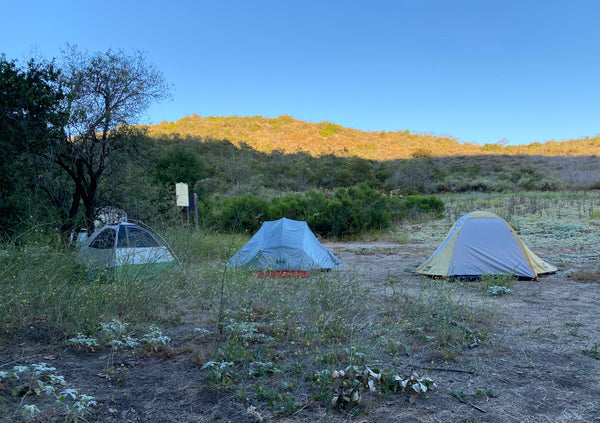This camping guide is brought to you in partnership with REI

New to camping and not sure where to begin?
If you’ve never camped before, you’re in for a real treat: starry nights, enjoying s’mores around the campfire, and beautiful days spent hiking in the wilderness.
Are you ready to camp but not ready to give up all the comforts of home?
Car camping is a great way to spend the night in nature while staying close to modern day conveniences. Drive right up, park your car, and pitch your tent.
All of us on the 52 Hike Challenge team have had at least one botched camping trip, and we’re here to help you avoid common mistakes that can make or break your experience.
In this camping guide, you’ll find tips from the 52 team on how to go camping safely and comfortably — and have lots of fun while you’re at it.
How To Go Camping: The 52 Hike Challenge Guide To Camping For Beginners
Keep reading to discover:
- How to get started camping
- What you need for beginner camping trips
- How to camp safely, comfortably and responsibly
- Ways to have tons of fun while on your camping trip
And much more

Photo credit: Karla Amador, 52 Hike Challenge co-founder
WHAT TO KNOW BEFORE YOU GO CAMPING
Where To Go Camping & How To Get There
When it comes to camping for beginners, easy access is key. You don’t need to venture into the remote wilderness on your first camping trip. In fact, we advise against it if you're new to camping. Simply find a campground that fits you and your family’s needs.
Step 1. Choose how you want to camp
For the purposes of this beginner camping guide, we recommend car camping. This way, you can bring as much food, water and gear as you want, and the car is only a short stroll away.

Photo credit: Lorin Hamm // @lorinhamm on Instagram
Step 2. Research campgrounds that fit your needs
Before you choose a campground, you should know the answers to these questions:
- Do you want to have a bathroom with showers, or are you okay with outhouses?
- Do you want to be in a large campground with hundreds of campsites, or do you prefer a small campground with a select number of sites?
- Do you mind being around RVs, or are you seeking a place with tent-only camping?
- Do you plan to have a campfire? Confirm that your selected campground allows fires.
- Are you bringing your dog on this camping adventure? Make sure pets are allowed at your chosen campground.
These are just a few questions to ask before selecting your campground. Luckily, there are lots of online resources that can help you find the perfect campground for you.
When it comes to searching for the right campground, we especially love using websites like www.recreation.gov and www.hipcamp.com.
Step 3. Reserve your campsite
Especially now, it’s ideal to make a reservation for a campsite. While some campgrounds operate as first-come-first-serve (FCFS), they might have changed their rules due to the onset of the pandemic. It’s always a good idea to call ahead and make sure.

Step 4. Map it out
Once you’ve found your campground, research directions. Keep in mind that cell reception may be spotty in some areas, so you shouldn’t rely solely on your phone’s GPS. Familiarize yourself with your route before you go, and take screenshots of the directions in case you lose reception.
Step 5. Find a friend to camp with
Whether you’re camping with a friend or a family member, we recommend going with someone for your first camping trip. While solo camping can be a lot of fun, you will likely find peace of mind by sharing this new experience with someone else.
Need a camping buddy? Join a 52 Hike Challenge Local Chapter in your area and link up with a like-minded hiker.
Step 6. Check the weather
Always check the weather before you leave for your camping trip. If inclement weather is in the forecast, we advise rescheduling your trip.
Keep in mind that you won’t have access to air conditioning, so you’ll want to avoid extreme heat. Also note that camping in thunderstorms is unsafe because you’re less protected from the elements.
Step 7. Set out on your camping trip!
Drive safe! The journey is half the fun.

Photo credit: Mandi Carozza // @freerangemandi on Instagram
Now that you know where to go camping, let’s talk about the best camping gear for beginners.
Camping Gear: What To Bring On Your Camping Trip
What’s one of the biggest perks of car camping? You can bring a ton of gear!
Pack your car with whatever will make you comfortable at camp, and don’t forget the camping essentials found below.
Any time you go into nature (whether you’re on a day hike or camping overnight), always make sure you carry the 10 Essentials:
-
Navigation (map & compass)

- Sun protection (sunscreen, lip balm, sunglasses, hat)
- Insulation (base layers, fleece, jacket)
- Illumination (flashlight & headlamp)
- Fire starter or matches
- Repair kit & tools
- Nutrition (snacks & meals)
- Water & hydration system
- Emergency shelter
- First aid kit
In addition to the 10 Essentials above, below you’ll find more camping necessities according your friends at the 52 Hike Challenge:
Camping Gear Essentials
(Okay, some of these are optional, but we want your first camping trip to be cozy and fun!)
- Tent
- Tarp
- Rain fly
- Duct tape & tent repair kit
- Sleeping bag
- Sleeping pad
- Inflatable pillow
- Water, water filter and hydration system
- Flashlight, headlamp & lantern
- Camping cookware
- We love the Coleman Triton available at REI
- A JetBoil is great to have if you like hot tea or camp coffee
- Cooking over the fire? A cast iron skillet is a must-have

Photo credit: Karla Amador // @lovekarlaamador on Instagram
- Propane or charcoal depending on how you’re cooking
- Food, camping meals, trail snacks, camp coffee, etc.
- S’mores makings: graham crackers, chocolate & marshmallows
- Toiletries (pro tip from our co-founder Karla: baby wipes are life changing)
- Camp chairs and hammocks
- Hiking day pack
- Extra blankets
- Sun protection
- Insect repellent & Tecnu poisonous plant defense
- Games: playing cards, football, frisbee, etc.
- Firewood*
*Always buy firewood at your campground or nearby. Please do not transport firewood from one town to another. This helps prevent the spread of invasive insects.
Comfortable Clothing for Camping
- Puffy jacket or vest
- Camp sandals
- Warm hat or beanie
- Hiking boots (we can’t wait to try the new REI Flash Boots)
- Layered moisture-wicking clothing (we love REI convertible pants)
- Rain jacket or poncho
- Hiking socks
- Pajamas
Get your Happy Camper T-Shirt in our shop!
Camping Gear Quick Facts
- Did you know a three season sleeping bag won’t keep you warm in the winter? Always check the weather before your adventure, and plan your gear accordingly.
- Did you know you can rent camping equipment from REI? Keep your trip low-cost when you know where to rent camping gear instead of buying it.
PRO TIP: Test Your Gear!
Avoid confusion at camp by testing your gear ahead of time. Practice setting up your tent, blowing up your bed, etc. You’ll thank yourself later.
Now that you’re ready to camp, let’s pitch our tents and enjoy the great outdoors!

Photo credit: Mandi Carozza // @freerangemandi
AT CAMP: BE AWARE WHILE YOU’RE THERE
When you follow campground rules and respect the wildlife as well as other campers, you’ll ensure that everyone has a safe and enjoyable experience.
Below you’ll find tips to Leave No Trace, Recreate Responsibly and stay safe while you’re camping.
Leave No Trace
Are you familiar with the 7 Leave No Trace (LNT) principles? These principles help to keep you safe, preserve nature habitats and protect wildlife.
- Plan ahead & prepare
- Travel and camp on durable surfaces
- Dispose of waste properly
- Leave what you find
- Minimize campfire impacts
- Respect wildlife
- Be considerate of other visitors
Click here to learn more about the 7 Leave No Trace Principles now.
Photo credit: Karla Amador, 52 Hike Challenge co-founder
Recreate Responsibly
There are many ways you can #RecreateResponsibly while camping. Here are just a few examples:
- Be aware of wildfire risks and practice campfire safety
- Clean up after you cook and store food properly
- Be inclusive and respectful of other campers
For more ways to recreate responsibly, visit www.recreateresponsibly.org.
Stay Safe While Camping
At the 52 Hike Challenge, we’re all about safety. Please stay safe by following these camping best practices:
- Check the weather before you head out
- Make sure your sleeping bag is rated up to par
- Learn and follow campground rules
- Bring enough water + a water filtration system
- Tell someone where and when you’re going
- Have an emergency plan
- Take only pictures, leave only footprints
Finally, last but not least…
Have Fun On Your Camping Trip!

When you plan, prepare and bring the right gear, camping is so much fun!
Here are a few fun ways to make your camping trip even more memorable:
- Tell scary stories around the campfire
- Roast marshmallows and make s’mores
- Get creative with your camp cooking
- Support a local business in a nearby town
- Hit the trails and go hiking!
Do you want to connect with more people who love the outdoors just as much as you do?
Join The 52 Hike Challenge, A Global Community Of Hikers, Campers, Backpackers & Outdoor Enthusiasts

Photo credit: @backpackin_she_wolf
We challenge you to take 52 hikes! Gain the physical, mental, emotional and spiritual benefits of hiking once a week for a year. You won’t regret it.



Amazing camping! Enjoyed reading your blog. Looking forward to completing my camping essentials.
https://campinggears.ph/food-storage-tips-for-camping-trips/
I found your article very helpful, thank you so much for your content.
David, author blog https://reviewseye.com/